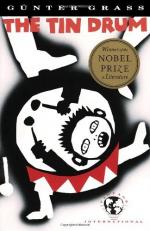|
This section contains 611 words (approx. 2 pages at 400 words per page) |

|
The Tin Drum Summary & Study Guide Description
The Tin Drum Summary & Study Guide includes comprehensive information and analysis to help you understand the book. This study guide contains the following sections:
This detailed literature summary also contains Related Titles and a Free Quiz on The Tin Drum by Günter Grass.
The Tin Drum is a fable of the mythical and diminutive Oskar Matzerath's life in the free city of Danzig, Germany during World War II. Oskar is a mythical figure, perfectly cognizant from the moment he is born. At his birth, Oskar's mother announces that at the age of three he will be given a drum. His father proclaims that at maturity, Oskar will inherit the family business, a small grocery shop. At that very moment, Oskar determines never to grow to maturity, but to stop growing after receiving the drum on his third birthday. The drum becomes Oskar's solace and his favorite method of communication. The novel follows Oskar's experiences during the war, defending a Polish post office against the Germans, and later entertaining the German soldiers with a troupe of dwarfs.
After his mother's death, the teenaged Oskar's amorous adventures with his babysitter, Maria, lead him to believe he is the father of her son, Kurt. Oskar is disappointed when Maria marries his father, but soon becomes involved in a gang of young hoodlums. Overcome with guilt at his father's funeral, Oskar throws his beloved drum into the grave, and magically begins to grow again, although he remains twisted and never gains full adult stature. Eventually Oskar is confined in a mental hospital in West Germany. Through Oskar's complex exploits during and after the war, Grass explores the relationship between war and art, and sex and religion, without resolving their intermingled roles in human affairs. While it contains many supernatural elements, the post-modern novel is not a simple allegory, but a complex mix of realism and myth that defies easy understanding or reduction to symbolism.
After the war, Oskar, Maria and Kurt flee to West Germany. Kurt develops a gift for commerce, and is soon operating a highly profitable black market business with Maria. Oskar, reluctant to accept their ill-gained profits, works as a stonecutter's apprentice and an artist's model. Soon, he has enough income to rent a room in a boarding house where he meets his friend Klepp and develops an unrequited love for Sister Dorothea, a nurse. Oskar and Klepp, a clarinetist, begin playing in a jazz band at a popular nightclub. After the nightclub owner's death, Oskar accepts an offer to tour solo, becoming a successful concert and recording artist.
When Oskar finds a severed finger near the river, he is tempted by his friend Vittlar to keep it preserved in a jar. Oskar worships the finger, while Vittlar keeps the aquamarine ring. Craving fame, Vittlar turns Oskar in to the police. Oskar is arrested and found guilty of the murder. He is confined to a mental asylum after insisting that he is Jesus.
Oskar is an unreliable narrator since those closest to him, including his male nurse Bruno, his friend Vittlar and even Maria herself, clearly do not believe much of his story. In particular, everyone including Maria denies that Oskar ever had sex with his stepmother. Therefore, Kurt could not possibly be Oskar's child. Oskar's continued protests that he is Jesus, and his confinement in a mental asylum, seem to support this view.
In true post-modern tradition, Grass's work allows multiple interpretations and fully supports none of them. Perhaps the most remarkable thing about this novel is that it was written at all. As late as 2001, a prominent American citizen of Austrian descent, Arnold Schwarzenegger, confessed that he was ignorant of his father's role in World War II. Discussion of the war was completely prohibited in Germany and Austria. Grass's moving novel of sex and guilt during the war, published in 1961, challenges that tradition of silence and breaks many taboos.
Read more from the Study Guide
|
This section contains 611 words (approx. 2 pages at 400 words per page) |

|



